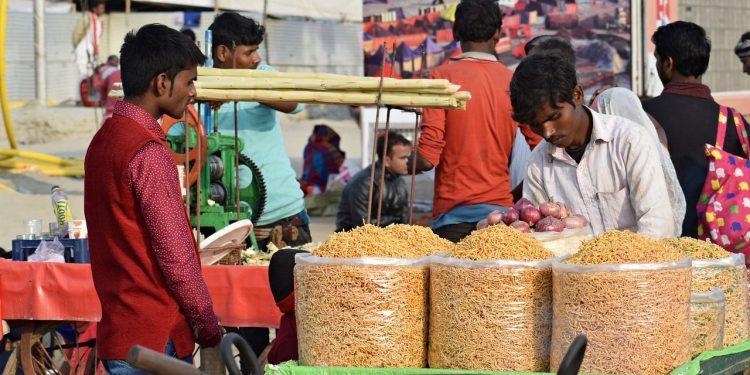On this International Hawkers Day, street vendors in India are at the crossroads of increasing existential issues due to large-scale eviction drives and increased pressure to abide by the rules governing the ban on the use of single-use plastics.
It was an early summer morning in 2023, and Prakash, (name changed on request) while on his way to his small eatery located at one corner of a prominent market in Delhi found his eatery demolished and raw materials spoiled. “I was running this eatery for a decade by myself but now it is gone,” said Prakash and added, “I now face an uncertain future as this was my only source of livelihood. I have a family to feed and take care of”. This is the story of several street vendors earning a livelihood in all the metro cities of India. They have the constitutional right to conduct business as per the Street Vendors (Protection of Livelihood and Regulation of Street Vending) Act, 2014, in which, Sections 12-16 of Chapter III highlight that the Street Vendors have the right to carry on the business of street vending and further emphasizes the legality and legitimacy of street vending as a profession. On the other hand, hawkers like Prakash still face the threat of eviction on the ground.
Rajesh (name changed on request) sells seasonal fruits moving from one street to anothe rover a hand-pulled cart. He procures plastic bags from local manufacturers which he use as carry bags to sell fruits. These days, Rajesh remains in constant fear of getting fined for flouting the ban on use of single Use Plastic. Under the Environment Protection Act 1986, the fine can be in the form of a penalty up to Rs 1 lakh or jail term of up to five years, or both. “I am always ready to comply with the Law, but give us some affordable alternatives to Plastic bags”. He added, “Cloth bags are very costly compared to plastic bags. I can’t afford to have many”. He procures plastic bags from a local plastic manufacturer and uses them daily to sell fruits despite knowing that it is not legal any more. The Ministry of Environment, Forest and Climate Change, Government of India, has notified the Plastic Waste Management Amendment Rules, 2021, which prohibits identified single-use plastic items which have low utility and high littering potential. The manufacture, import, stocking, distribution, sale and use of several single-use plastics, including polystyrene and expanded polystyrene, commodities stands prohibited since July 1, 2022.
In both these cases, the street vendors are often found at the receiving end of civic eviction drives – sometimes when a city needs a refurbished and clean look arising out of a VIP or an international delegation visit and at other times as routine action to make roads street vendor/ hawker free. Article 19(1)(g) of the Constitution guarantees every citizen the right to practice any profession or to carry on any occupation, trade or business. Likewise, hawkers have the fundamental right to carry on trade or business of their choice but one must remember here that this right is subjected to reasonable restriction imposable under Article 19(6) of the Indian Constitution.
The Climate Assault on Hawkers:
Of late, one must also acknowledge that Street vendors/ hawkers are also becoming indirect victims of global warming and need protection from climate extremes. From an unplanned and haphazard Urban development observed over a period resulting in increased instances of cities getting inundated with rainwater to an uncontrolled level of AQI observed due to unplanned growth of polluting industries within the urban area, the street vendors are facing it all further exacerbated by the climate crisis. As most street vendors are found to be in the global South, there is an increasing need to acquire more information to understand how the climate crisis affects them.
Towards making street vendors self-reliant
The Ministry of Housing and Urban Affairs of the Government of India announced the Pradhan Mantri Street Vendor’s AtmaNirbharNidhi (PM SVANidhi) scheme to support the hawkers during the pandemic. This is a Central Sector Scheme to facilitate street vendors to access affordable working capital loans to resume their livelihood activities. The objective is to facilitate a working capital loan of up to INR10,000/-, to incentivize regular repayment; and to reward digital transactions. The Govt to date has received 6,533,344 applications, out of which 4,836,466 were sanctioned and 4,602,324 were disbursed. The total amount sanctioned is INR 6,101.5 Cr and INR 5,740.36 Cr has been disbursed as of May 25, 2023.
Data Source: https://pmsvanidhi.mohua.gov.in/Home/PMSDashboard
On this International Hawkers Day, The Ministry of Housing and Urban Affairs should continuously pursue and follow up with the States/ UTs to carry out and complete Vendor Surveys according to The Street Vendors (Protection of Livelihood and Regulation of Street Vending) Act, 2014 and issue Certificate of Vending to the vendors identified in the survey. The States/ UTs should activate Town Vending Committees (TVCs) which have the authority to implement the hawker’s policy and should complete the notification of vendors’ zone or market at the earliest which are essential for the implementation of the Central law.
An active Central Monitoring Committee is the need of the hour that will meet at specific intervals to review the progress, discuss and thrash out the hurdles/issues, if any, faced in the implementation of The Street Vendors (Protection of Livelihood and Regulation of Street Vending) Act, 2014, and share the good practices in implementing the provision of the Act such as setting up of vending zones, vending markets, etc.



